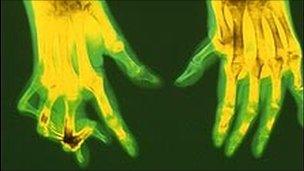Arthritis patients 'may benefit from weight training'
- Published

Rheumatoid arthritis affects people's joints
A regular weight training regime may help treat rheumatoid arthritis, research suggests.
A study of 28 patients funded by Arthritis Research UK found those who pumped iron saw improvements in basic physical function, such as walking.
Researchers at Bangor and Gwynedd Hospital said such high intensity exercising could play a key role alongside drug treatment.
Experts said the exercise regime would not be appropriate for all patients.
RA is mainly a disease affecting the joints, but a less well known symptom is that it also severely reduces muscle mass and strength and this occurs even among patients whose disease is well managed.
Those with the condition are often given mild home exercises to do to stop their joints stiffening and becoming painful.
Weight training
To test how effective the weight training was the researchers split the 28 participants into two groups, the Arthritis Care and Research journal reported.
One did regular weight training for 24 weeks, while the others did the less strenuous standard home exercise regimes.
They found physical function improved by between 20% to 30% in the group doing weight training. Strength also increased by nearly 120%.
The high intensity training was found to increase the levels of an insulin-like growth factor (1GF-1) and insulin-like growth binding protein 3 - both of which promote the growth of muscles, bone and cartilage.
Study leader Dr Andrew Lemmey said muscle loss was a major contribution to the disability associated with the condition.
"Lifting, carrying, walking, climbing stairs are impaired.
"It is logical that if you can restore muscle, that strength and consequently functional capacity will also be restored. And this is what we have found."
He said the patients, who were mainly women in their 50s and had the disease for up to a decade, had responded well.
"In fact, the improvements in function were so significant that following training these patients with established RA were performing as well as or better than healthy individuals of the same age and sex."
He said he would like to see this sort of high intensity treatment funded along with drug therapies, but said that a multi-centre trial would be needed before this could be agreed and that they had received no funding for this.
Benefits were thought to be lost four to eight months after training ended.
A spokesman for Arthritis Research UK said: "Weight-training, especially at this level, is not for everyone with rheumatoid arthritis, but for those who are very well-motivated and physically able, we have proved that it can dramatically improve muscle strength and tone."
A spokesman for the National Rheumatoid Arthritis Society agreed, but urged caution.
"Of course RA can affect different people in very different ways so pumping iron may not be appropriate for everyone. People should discuss [this] with their physio."